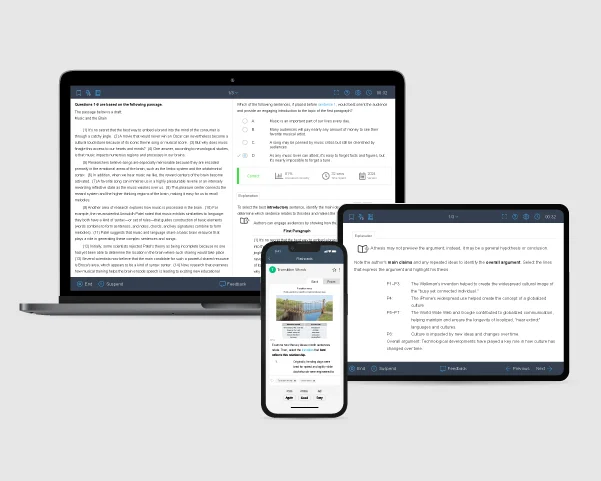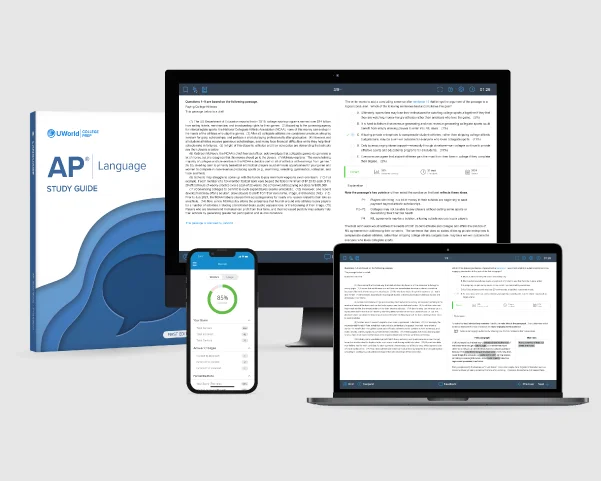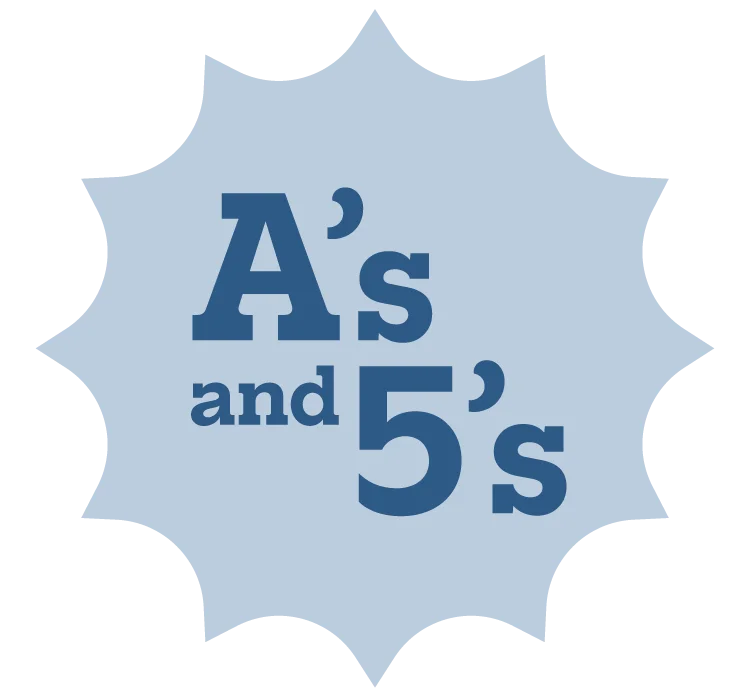Format of the AP English Language FRQ Section
There are 3 free-response questions (FRQ) on the AP English Language exam that needs to be completed in 2 hours and 15 minutes, giving you approximately 40 minutes for each essay. However, you can use more or less time for each one.
You’ll find 3 types of AP English Lang FRQs on the exam:
FRQ 1: Synthesis Question
FRQ 2: Rhetorical Analysis
FRQ 3: Argument
Please note that you’ll have 15 minutes specifically designated for reading the documents, but you are free to commence writing at any point during that time. Evaluators rate each essay on a scale from 0 to 6 points. The entire AP Lang FRQ section contributes 55% to the exam score, with each essay carrying equal weight.
How to Answer AP English Language FRQs
Here are some general tips for approaching the AP Language and Composition free-response questions:
-
Before you get started, look over all the prompts and begin with the one that seems the easiest.
Starting with the most straightforward question can boost your confidence to succeed in this section. For some students, the synthesis question is the easiest because it allows you to write about an issue for which you have evidence. The argument question is the easiest for other students because they can choose their position and evidence. Many students answer the rhetorical analysis question last because they prefer to quickly write the easier essays to have more time for the harder ones.
-
State your thesis in the introduction.
Your thesis should encompass a defensible position or a defensible analysis of the writer's rhetorical choices, avoiding a mere summary or restatement of the prompt. A defensible position denotes a clear statement of your stance on the issue presented in the prompt. Although you can place the thesis anywhere in your response, the introduction proves to be the most effective location. However, remember not to spend excessive time on your introduction; two or three sentences will suffice. If you find yourself running out of time, include at least a thesis for all essays, as you will receive at least one point for it.
-
Use evidence to support your position or analysis.
To score well on the AP Lang FRQs, include quoted or paraphrased proof of your ideas in your essays. Focus on specific words and details from the text that support what you have to say. For the argument essay, include specific references to people, events, and situations to support your ideas. Be sure to explain how the evidence illustrates your concept. Two pieces of evidence for each of your points are sufficient; don’t include lists of quotes without describing how they support your position or analysis.
-
You do not need a conclusion to earn a high score.
However, if you have time to write a sentence that pulls your ideas together at the end to make your essay sound finished, you should write one.
-
Don’t worry about making spelling, punctuation, and grammar mistakes.
The graders understand that you are writing under time pressure, and your essay is more like a rough draft. If you make a mistake or change your mind, simply draw a line through it and keep going.

AP English Language FRQ Examples
Here are some AP English Lang FRQ examples to illustrate the kinds of questions you will see on the exam. The following AP English Lang FRQ examples come directly from the College Board® course and exam description guide and are an excellent source to practice with.
The synthesis question includes six to seven references organized around a specific topic. Two sources are visual, such as charts, graphs, photographs, or political cartoons. The remaining sources are excerpts from articles containing about 500 words per source. You must write an essay synthesizing material from at least three of the provided sources and developing your position on the topic.
If you’re wondering how to write a good response for the Synthesis question, here are some tips to keep in mind:
- This essay will use a topic that does not have a clear yes/no or good/bad opinion on it. It will have complexity; everybody's perspective will have something positive and negative about it. While acknowledging the opposing viewpoint is essential, you should write more strongly in favor of one side than the other. Do not write an essay that equally explores an issue's various sides without clarifying your position.
- Pick two pieces of evidence to support your argument and one from the opposition to use as a concession or to refute. By doing so, you earn points for using three pieces of evidence, enabling you to write two good body paragraphs that recognize the issue's complexity.
FRQ Example Passage 1
As the Internet age changes what and how people read, there has been considerable debate about the future of public libraries. While some commentators question whether libraries can stay relevant, others see new possibilities for libraries in the changing dynamics of today’s society
Carefully read the six sources, found on the AP English Language and Composition Classroom Resources Page, including the introductory information for each source. Write an essay that synthesizes material from at least three of the sources and develops your position on the role, if any, that public libraries should serve in the future.
Source A (Kranich)
Source B (calendar)
Source C (Shank)
Source D (charts)
Source E (Siegler)
Source F (ALA)
In your response, you should do the following:
- Respond to the prompt with a thesis that may establish a line of reasoning.
- Provide evidence from at least three of the provided sources to support your thesis. Indicate clearly the sources used through direct quotation, paraphrase, or summary. Sources may be cited as Source A, Source B, etc., or by using the description in parentheses.
- Explain the relationship between the evidence and your thesis
- Demonstrate an understanding of the rhetorical situation.
- Use appropriate grammar and punctuation in communicating your argument.
Source: College Board
The rhetorical analysis question presents students with a passage of approximately 600 to 800 words of nonfiction prose. You must write an essay that analyzes the writer’s rhetorical choices. Many students often ask, “How do I write a good response to the rhetorical analysis question?” If you’re seeking answers to the same question, here are some tips:
- Summarize each paragraph as you read it by making notes on the scratch paper. Highlight things you notice the speaker doing to communicate his message. You do not need to use terms like logos, pathos, or ethos to describe the speaker's rhetorical choices. Using specific terms like those may hinder your ability to write about them. Simply explain what the speaker is doing. For example, the speaker may recall events from their personal experience to evoke sympathy from the audience, establish their credibility to speak about a topic, or create nostalgia for times past.
- Consider these questions: How does the speaker portray the topic they are discussing – positively or negatively? How do you know? The answers to those questions compose the crux of the entire essay.
- The top essay score is 6; you can easily score 4. Here's how:
- ALWAYS write a thesis = 1 point.
- The most common point split for Evidence and Commentary is between 2 and 3. Don't summarize the passage; that only earns you one point.
- Pick something specific the speaker does to get their purpose across and explain how the speaker makes it work = 2 points. Explain another rhetorical choice the speaker uses = 3 points.
FRQ Example Passage 2
In May 2012, former United States Secretary of State Condoleezza Rice, who was the first African American woman to hold that position, gave a commencement speech to the graduating class of Southern Methodist University, a private university in Dallas, Texas. The passage below is an excerpt from that speech. Read the passage carefully. Write an essay that analyzes the rhetorical choices Rice makes to convey her message to her audience.
In your response, you should do the following:
- Respond to the prompt with a thesis that analyzes the writer’s rhetorical choices.
- Select and use evidence to develop and support your line of reasoning.
- Explain the relationship between the evidence and your thesis.
- Demonstrate an understanding of the rhetorical situation.
- Use appropriate grammar and punctuation when expressing your argument.
What do I mean by human progress? I believe that all human beings share certain fundamental aspirations. They want protection for their lives and their liberties. They want to think freely and to worship as they wish. They want opportunities to educate their children, both boys and girls. And they want the dignity that comes with having to be asked for their consent to be governed.
All too often, the difference has been used to divide and dehumanize. I grew up in Birmingham, Alabama—a place quite properly called the most segregated city in America—and I know how it feels to hold aspirations when half your neighbors think that you’re incapable of or uninterested in anything higher. And I know there are some in this audience who have perhaps faced the same.
And in my professional life, I have listened in disbelief as it has been said of men and women in Asia, Africa, and Latin America, as well as Eastern Europe and Russia, from time to time, that they do not share the basic aspirations of all human beings. Somehow, these people were just “different.” That meant “unworthy of what we enjoy.” “Maybe they’re just not ready for democracy,” it would be said. But of course, this was once said, even about black people. We were just too childlike. We didn’t care about rights or citizenship or the vote. We didn’t care about freedom and liberty.
Well, today in the Middle East, the last bastion of that argument, people are putting a nail in the coffin of that idea. They are not just seeking their freedom, they are seizing it. But freedom and democracy are not the same thing. Freedom and rights have to be institutionalized into the rule of law, into constitutions. And if you don’t think constitutions matter, just remember this: When Martin Luther King Jr. wanted to say that segregation was wrong, in my hometown of Birmingham, he didn’t have to say that the United States had to be something else—only that the United States had to be what it said it was. That is why the creed matters.
But stable democracy requires more than just the institutionalization of freedom. It requires that there can be no tyranny of the majority. And most importantly, it requires that the strong can not exploit the weak. Indeed, democracy is only as strong as its weakest link. And indeed, if every life is equal before the law, and within the eyes of God, then every life is worthy. Every life is capable of greatness. And it truly doesn’t matter where you came from, it matters where you are going.
At SMU, you have been taught the importance of service. You have been taught to serve those who are less fortunate. And yes, it will help them, but it will help you more. Because when you encounter those who are less fortunate, you cannot possibly give way to aggrievement—“Why do I not have?”—or its twin brother, entitlement—“Why don’t they give me?” In fact, you will ask instead, not “Why do I not have?” but “Why have I been given so much?” And in that spirit, you will join the legions of impatient patriots and optimists who are working toward a better human future. And yes, sometimes it seems very hard indeed. But always remember, in those times of trial, that what seems impossible seems inevitable in retrospect.
I read one summer the biographies of the Founding Fathers, when things weren’t going very well for us in the Bush Administration.* And by all rights, the United States of America should actually never have come into being—what with a third of George Washington’s troops down with smallpox on any given day, the Founding Fathers squabbling among themselves, and against the greatest military power of the time—but we did come into being.
And then we fought a civil war, brother against brother, hundreds of thousands dead on both sides—and yet we emerged with a more perfect Union.
And those of us who live in the West and have ever come across the Continental Divide know that they did it in covered wagons. And they had to be optimists because they didn’t even know what was on the other side and they kept going anyway. And in Birmingham, Alabama, a little girl whose parents can’t take her to a movie theater or to a restaurant—her parents nonetheless have her convinced that she may not be able to have a hamburger at Woolworth’s lunch counter, but she can be president of the United States if she wanted to be, and she becomes the Secretary of State. You see, things that seem impossible very often seem inevitable in retrospect.
- *Rice was Secretary of State from 2005 to 2009 under George W. Bush.
Source: College Board
The argument question presents students with a literary or rhetorical concept or idea, requiring them to craft an essay that argues their position and supports it with evidence from their own experience, reading, or observations. Here are some tips to assist you:
-
When facing a lack of ideas for evidence, try using the "ripple effect."
Think of events, people, and situations you know closely and move outward from there. Think of a personal example, then an example from someone you know/ something you've seen, then something/someone famous, influential, or historical. Valid examples can come from categories such as art, science, sports, music, gaming, and entertainment, to name a few. They don't always have to come from a textbook.
-
The same general tips to achieve a score of 4 apply to the argument essay as to the synthesis essay.
Write a thesis to receive one point. Explaining how one example supports your position will earn you two points. Explaining how two examples support your position will earn you 3 points.
-
Don't get lost in explaining all the details of your example
Just focus on the parts that tie into the point you are making and spend your energy explaining how your example supports your position.
FRQ Example Passage 3
The late Barbara Jordan, a former United States representative, once warned, “[T]his is the great danger America faces—that we will cease to be one nation and become instead a collection of interest groups: city against suburb, region against region, individual against individual; each seeking to satisfy private wants.
Write an essay that argues your position on Jordan’s claim that “private wants” threaten national identity.
In your response, you should do the following:
- Respond to the prompt with a thesis that may establish a line of reasoning.
- Select and use evidence to develop and support your line of reasoning.
- Explain the relationship between the evidence and your thesis.
- Demonstrate an understanding of the rhetorical situation.
- Use appropriate grammar and punctuation in communicating your argument.
Source: College Board
How can I practice AP English Language free-response questions?
The best way to practice for AP English Language and Composition free-response questions is to use released questions from the College Board’s previous exams.
If you are enrolled in the AP English Lang class, your teacher will guide you in developing effective responses and provide feedback on your writing throughout the year. However, if you are self-studying, refer to the released questions, sample student responses, and score explanations on the College Board website. You can adopt similar strategies by researching the qualities that make high-scoring essays successful. Ensure you are well-acquainted with the rubrics used by the graders to score each essay, as they outline the required information you should include in your responses.
Take your AP English Language preparation to the next level with our AP Language prep course. It features a comprehensive study guide and an extensive QBank combined with personalized learning tools and performance tracker to deliver top results.
Frequently Asked Questions (FAQ)
How many FRQs are on the AP English Language exam?
There are 3 FRQs on the AP English Language exam: Synthesis, Rhetorical Analysis, and Argument. They always appear in this order.
How are AP English Language FRQs graded?
The FRQs are graded by high school AP Lang teachers and college professors who teach freshman-level English courses. The College Board provides rubrics that tell graders what to look for in successful essays. Essays are primarily graded on the quality of their ideas and not on grammar, punctuation, or spelling accuracy.
How long is the AP English Language FRQ section?
Students have 2 hours and 15 minutes to complete FRQs on the AP English Lang exam, which equals 40 minutes per essay with 15 minutes to read. However, students can spend more or less time on each essay.
Where can I get past AP English Language free-response questions?
You can find released questions from past exams on the AP Central website.

References
(2024). Exam Format. AP English Language and Composition. College Board. Retrieved on January 16, 2025 from https://apcentral.collegeboard.org/courses/ap-english-language-and-composition/exam
Related Topics
Answering MCQs might seem easy, but the correct choice often hinges on subtle differences! Let’s guide you through selecting the right answer for AP English Language MCQs.
AP English Language Study Plan & TipsLooking for the perfect study plan for AP English Lang? Discover key strategies and quality resources to help you achieve your best score on the AP English Language exam!
About AP English Language ExamWant to know if AP English Language and Composition suits you? Get to know everything about the exam here: what’s on the exam, prerequisites, benefits and difficulty!
Best AP English Language Prep Course ReviewDiscover the best AP Eng Lang prep courses available. Compare key features, pricings, reviews, and benefits to select the course that best fits your learning.
Best AP English Language Study Guide ComparisonKaplan vs. Barron's vs. Princeton Review vs. UWorld—compare strategies, features, and effectiveness to find the ultimate guide for AP English Language success.
How to Self-Study for AP English LanguageLearn how to self-study for AP English Language & Composition exam like a pro! Follow this comprehensive plan filled with tips, tools, and resources for success.




